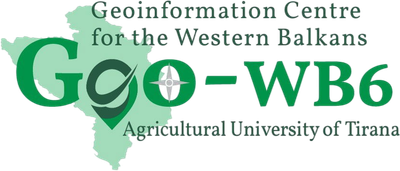About GEO-WB6
Empowering the Western Balkans with Geoinformation Technology
Geoinformation is vital for assessing environmental conditions and enabling well-founded decisions on land use, sustainable resource management, and nature conservation. In the Western Balkans, however, the potential of geoinformation technology remains underutilized, mainly due to a shortage of qualified professionals and limited training opportunities. This is a major bottleneck fort the EU accession process regarding negotiating Chapter 11 (Agriculture and Rural Development) and Chapter 27 (Environment).
The GEO-WB6 project aims to close this gap by establishing a Geoinformation Centre. The Centre focuses on improving human resources for the management and analysis of geodata and fosters a regional network of geoinformation experts. We envision the Center becoming a regional hub for geoinformation science in the Western Balkans, advancing the region's research capacities and supporting public institutions, academia, and NGOs.
GEO-WB6 is funded by the German Federal Ministry of Food and Agriculture (BMEL) and jointly implemented by the Agricultural University of Tirana (AUT) and the Leibniz Institute of Agricultural Development in Transition Economies (IAMO).
The project consists of three components:
1. We provide ample training opportunities with a comprehensive program of courses, summer schools and seminars. Our program targets students, researchers, lecturers and representatives of governmental institutions from the region who have a professional interest in applying geoinformation approaches in agriculture, rural development and natural resource use.
During the project duration, we conduct:
- Eight methodological training courses in GIS, spatial data analysis, and remote sensing.
- Two thematic summer schools with a focus on the Integrated Administration and Control Systems (IACS).
- Monthly online seminars about research applications of geoinformatics in the region
2. We offer geoinformation services for regional stakeholders and are developing tools to improve geodata and management. This includes the development of a geoportal with metadata on agriculture and sustainable resource use, as well as a geodata management system at AUT to support research data collection.
3. We foster regional exchange by building a network of geoinformation experts in the Western Balkans. We support research projects at Western Balkan research institutions, facilitate scientific exchange with German institutions, and provide opportunities for short-term research stays at IAMO to early-career scientists from the region. In November 2025, we will organize a research session at the ICOALS conference and will organise a regional stakeholder workshop to advance geoinformation science in the Western Balkans.



